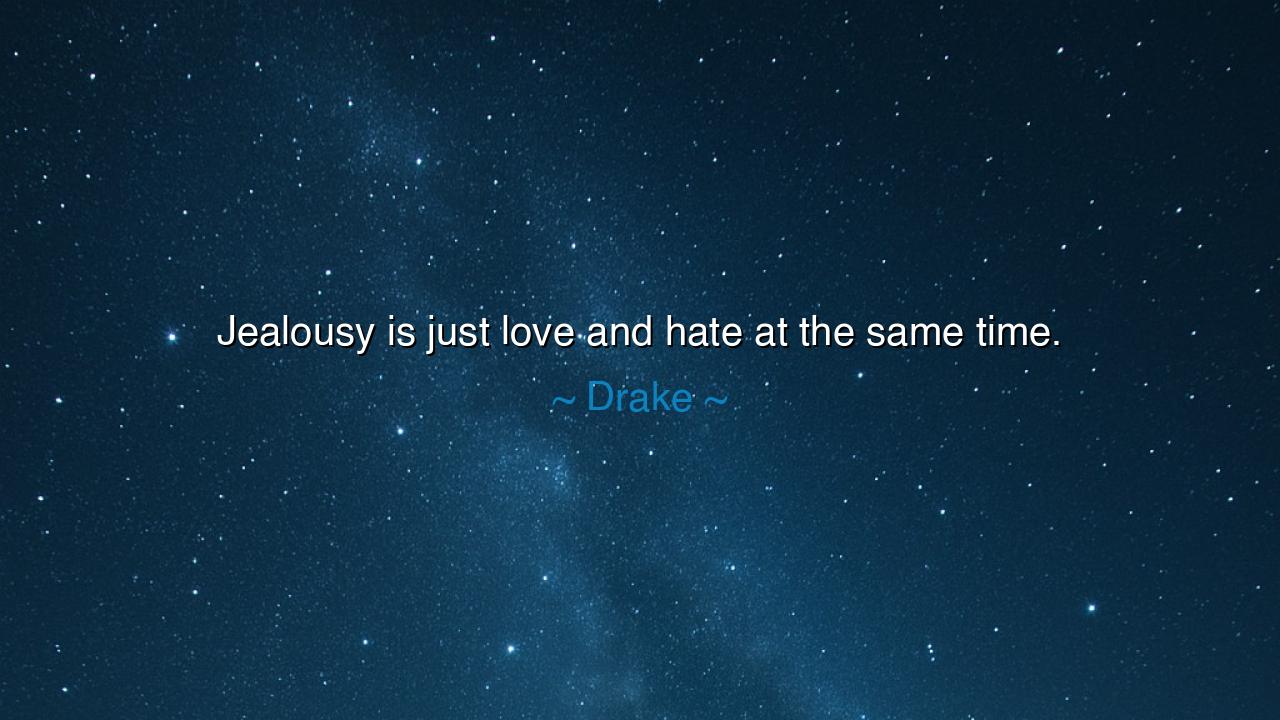
Jealousy is just love and hate at the same time.






There is a strange and piercing beauty in the words of Drake, the poet of modern passion, who once said: “Jealousy is just love and hate at the same time.” Though born in the age of rhythm and fame, his insight is ancient—older than kings, older than scripture—for it speaks of the eternal war within the human heart. In this single line, he captures the tragic paradox that has haunted lovers, rulers, and dreamers throughout history: that jealousy is not the absence of love, but its shadow—love twisted by fear, and devotion poisoned by desire.
To understand this, one must look deeply into the nature of love itself. True love is a force both divine and perilous—it elevates the soul, but also exposes its deepest vulnerability. When one loves, one gives power to another, entrusting them with one’s peace, one’s pride, one’s hope. But when that trust trembles, when affection feels threatened, love transforms into jealousy—the same flame that once warmed now burns. Thus, Drake’s words are no mere confession of emotion, but a revelation: that jealousy is love corrupted by insecurity, and hate born from longing. It is the heart tearing itself apart between wanting to possess and fearing to lose.
History is filled with tales that prove this truth. Consider the tragic story of Othello, the Moor of Venice, whose love for Desdemona was fierce and consuming. When poisoned by the lies of Iago, that love turned inward and became his undoing. Othello did not cease to love; rather, his love was devoured by suspicion. In his torment, he both adored and despised the woman he once cherished, until jealousy drove him to murder the very soul he could not live without. In this, we see Drake’s meaning fully revealed—jealousy as the coexistence of love and hate, a paradox that can destroy even the noblest of hearts.
Yet jealousy is not only the torment of lovers—it is a force that moves through all human bonds. Brothers have envied brothers, as Cain envied Abel, not because they hated, but because they loved what the other had—approval, light, favor. Friends have turned enemies for the same reason. Nations have gone to war, not from indifference, but from envy cloaked as righteousness. Every act of jealousy is born not of apathy, but of passion misplaced. It is the heat of love turned inward, unable to express itself purely, and so it becomes destruction.
But let us not condemn jealousy too quickly, for within it lies a mirror of the soul. To feel jealousy is to feel deeply; to suffer because one cares. The ancients would say: where there is jealousy, there is fire, and where there is fire, there is life. The wise, however, learn to master that fire rather than be consumed by it. For jealousy, when understood, can teach humility—it reveals the wounds of pride, the fear of loss, the craving for certainty that no mortal can have. In recognizing jealousy, we confront not the fault of others, but the frailty within ourselves.
Drake, in his worldly yet heartfelt way, distilled a universal truth that philosophers have long pondered: the human heart is never singular. It is capable of holding love and hate together, of yearning and resenting in the same breath. It is the paradox of being human—to love deeply is to risk pain, and to care fiercely is to flirt with jealousy. But wisdom lies in choosing which side of the flame to feed. For where love forgives, jealousy consumes; where love trusts, jealousy corrodes.
The lesson, then, is clear. When jealousy stirs in your heart, do not deny it, but transform it. Look upon it as a signal that love has lost its balance. Ask yourself not, “Whom do I envy?” but “What am I afraid to lose?” Replace possession with gratitude, comparison with compassion. For love cannot survive where hate lives beside it—it must be freed from fear to remain pure.
And so, let the generations remember the truth in Drake’s simple yet eternal words: “Jealousy is just love and hate at the same time.” It is the battle of two forces born from one heart. To conquer it is to choose love over fear, light over shadow, creation over destruction. For in that choice lies not only peace—but the highest proof of wisdom: that we have learned to love without chains, and to trust without torment.






AAdministratorAdministrator
Welcome, honored guests. Please leave a comment, we will respond soon